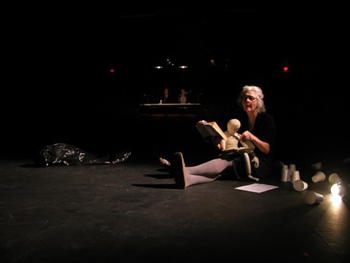
LEAR gets new life thanks to Philip McKee and Harbourfront Centre World Stage in Toronto
‘A show built out of moments’ is the first method I could think of to describe World Stage’s latest production of LEAR at the Harbourfront Centre Studio Theatre. An adaptation of Shakespeare’s irreverent drama King Lear, brought to the stage with great care by director Philip McKee, and performed with gentle power by three women. That’s right, King Lear is a she.
To flesh out my explanation of this piece, I’d further posit that it’s an intricate performance of subtleties, built upon the success of moments of interaction between characters. Basically, what you can expect to occur on the Harbourfront Centre Studio’s mostly barren stage is a closer inspection of the singular moments within Shakespeare’s text as opposed to the whole story arc itself. McKee takes the story of Lear and, in a way, puts it under a microscope –or in this case, a microphone- amplifying the relationships between Lear and his daughters and cutting out the extra bits of story.
If you’ve never seen or read King Lear, you may want to read a synopsis or go seek out someone who’s familiar with it, because I think the performance might seem a bit off-kilter without any prior knowledge of the play. Having quite a lot of experience with the play (basically studying it to death in one of my first university English classes), I think I was able to keep tabs on what McKee was trying to do and I think he’s hugely successful.
Clare Coulter’s Lear is possibly one of the most riveting performances I’ve seen in a long while. She implements a sense of clownish silliness at the start of the show, peering out from between a large space in the drawn curtains with impish glee, but transforming into a robust kingly presence as she asks that fateful question of her daughters: Which one loves her the most? Two decisions McKee makes that I find incredibly powerful are the dialogue between Lear and the Fool –played by a faceless puppet manned by Coulter- and a long moment when Coulter stands alone on stage. It’s a transitional section both in the play and for the audience as we were required to change our seats and sit in a row of chairs set up directly on the stage. Coulter stands staring off into the distance, though remains very much engaged, and I know this because I was actually sitting right in front of her, watching her face (not creepy, I swear, but a really powerful moment).
The daughters Goneril and Regan – played by Liz Peterson and Amy Nostbakken respectively – engage in their competitive natures through a mesmerizing movement section that increases in velocity as the tension builds between them. Cordelia – potently portrayed by Lindsey Clark – spends a lot of time seated in the audience, but exudes a quiet strength in each moment she has with Lear from the beginning to the end.
Sound, lighting and staging play an important role in the piece in terms of setting tone and cadence as there isn’t any real set to speak of. McKee’s LEAR is less about the whole package, than the sum of its parts. It’s a fascinating show that’s worth a gander, even if you’re wary of the experimental. I will gladly admit that I was enthralled, and I’m sure any of you who feel even the slightest bit adventurous will be, too.
Details:
- LEAR is playing at the Harbourfront Centre Studio Theatre(235 Queens Quay W.) until March 10,2013
- Shows run Friday to Sunday at 8 pm, Saturday and Sunday at 4 pm
- Ticket prices range from $15-$30
- Tickets are available online or by calling the box office 416-973-4000
Photo of Clare Coulter by Guntar Cravis.
